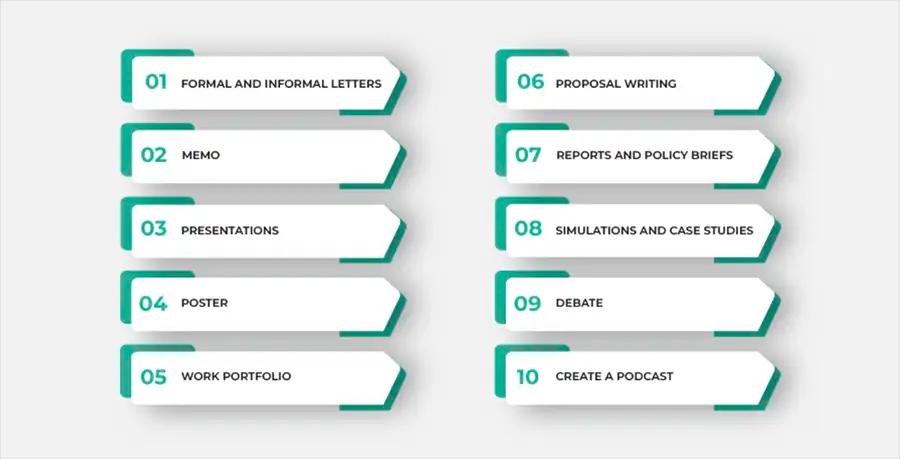Explore Courses
Top University

Jagpreet
28 August, 2024
Table of Contents
Assessments and exams are always scary words for students. When the learning pedagogy has changed at large, the evaluation methods must be upgraded. In today’s educational landscape, the traditional assessment methods are being re-evaluated. Apart from the fact that they prioritise memorisation over critical thinking, conventional assessment methods caused stress and anxiety among students. Though it has its respective merits, educators are shifting to alternative assessment methods in education. Now why are the new education policy and reforms stressing over alternative assessment methods?
<>In this blog, we have discussed the outcomes of alternative assessment methods in education and listed a few examples. This will answer all your questions.
There are two main types of assessments that teachers generally use. Though both of them share the same goal, their approach is different. Let’s see how:
| Traditional Assessments | Alternative Assessments |
| They are formal tests that include multiple-choice questions, short answers, true/false, etc. | Allow students to apply their classroom learning with high-order thinking skills. |
| Pen-paper tests or sometimes conducted on computers | Require higher cognitive skills unlike the pen-paper tests |
| Straightforward for teachers to grade | Gives teachers an evidence-based idea of the student’s learning |
| Limited flexibility to customise questions | More time-consuming than traditional assessments |
Alternative assessment methods comprise of evaluation approaches that go beyond the pen-paper tests conducted at the end of the session. They are designed to assess students based on their understanding, competencies, and skills through different means. They generally require students to make a judgment about the problem asked and use the skills learned in class to solve it. Thus, demanding a high level of thinking skills and thorough understanding.
Here are some of the commonly used alternative assessment methods in education:
✅ Portfolio: A portfolio is referred to as the collection of all your work including projects, certifications and achievements you made to showcase your skills and progress.
✅ Performance Based Assessment: Teachers assign tasks that require students to apply their knowledge and show practical skills.
✅ Self-Assessment: Processes or methods through which students can assess themselves. For example, worksheets, rubric self-assessments, reflective journals, online quizzes with instant results, and many others.
✅ Project-Based Learning: This is the most widely adopted assessment method where students are given long-term projects. These projects require you to apply multiple skills and in-depth subject understanding to make the final presentation.
✅ Oral Exams: Teachers conduct viva, debate, class discussions and other oral tests to assess the student’s understanding.
Apart from this, several other alternative assessment methods can be incorporated into the curriculum.
Alternative assessments can also be referred to as authentic or performance-based assessments. These assessments can be used to test students in both ways, formative and summative. According to University of Illinois Chicago , studies have shown many long-term benefits for the students. We have discussed below some of the outcomes of alternative assessment methods in education in detail:
✅ Holistic Understanding: Where traditional assessments require rote memorisation, alternative assessments test the holistic understanding of the students. For instance, the projects and performance-based assessments allow students to apply their learnings in real-world scenarios through which you can judge whether or not the student has understood the topic.
✅ Better Motivation and Engagement: Since alternative assessments involve hands-on learning using innovative programmes, students find it more engaging. In such cases, their stress and anxiety level is low which keeps the students motivated.
✅ Personalised Learning: Alternative assessment methods have a higher scope of accommodating the needs of different students. As every student has unique learning styles, these assessments are flexible to ensure all students are challenged and assessed appropriately.
✅ Real-World Relevance: Some alternative assessments are based on real-world case scenarios which helps bridge the gap between classroom learning and practicality of concepts.
✅ Boost in Confidence: As per research reviewed by University of Illinois Chicago , 90% of students experienced a confidence boost.
✅ Higher Retention: By participating in different activities of alternative assessments, you can strengthen your conceptual knowledge which impacts retention. With rote memorisation you cannot go a long way, whereas, alternative assessments increase student engagement and improve retention.
Here are a few examples of assignments that can be incorporated into the curriculum:

To enhance the impact and the outcomes, the alternative assessments should be well-planned and properly communicated to the students. The following are things you should keep in mind while designing alternative assessments:
✅ First identify the learning objectives and desired outcome
✅ Determine how you wish to measure the learning of the students orally, through presentation or written report
✅ Keep in mind the potential of each student and their learning style because ultimately they are the ones who are being evaluated
✅ If there are students who become overwhelmed, you can break them down into manageable steps like giving them a deadline for progress.
✅ Be realistic when deciding the time frame. From planning to allocation and preparing the final result, everything you plan keeping in mind the time frame.
he adoption of alternative assessment methods in education highlights the huge shift towards more meaningful and inclusive evaluation techniques. By embracing these methods, student engagement increases, their retention capacity and benefits them in long term. Moreover, the education system is in the evolution phase which makes these alternative assessment methods more relevant and open to change as per the needs.
The alternative assessment aims to let students showcase their knowledge and practical skills.
Alternative assessments motivate students to apply knowledge to practice rather than memorising the topic.
Assessment tools help in evaluating student student’s learning and progress beyond the traditional exam.
Our team of experts, or experienced individuals, will answer it over online meet. Book your slot now!
Book Free Online CounsellingGet Free Career Guidance
